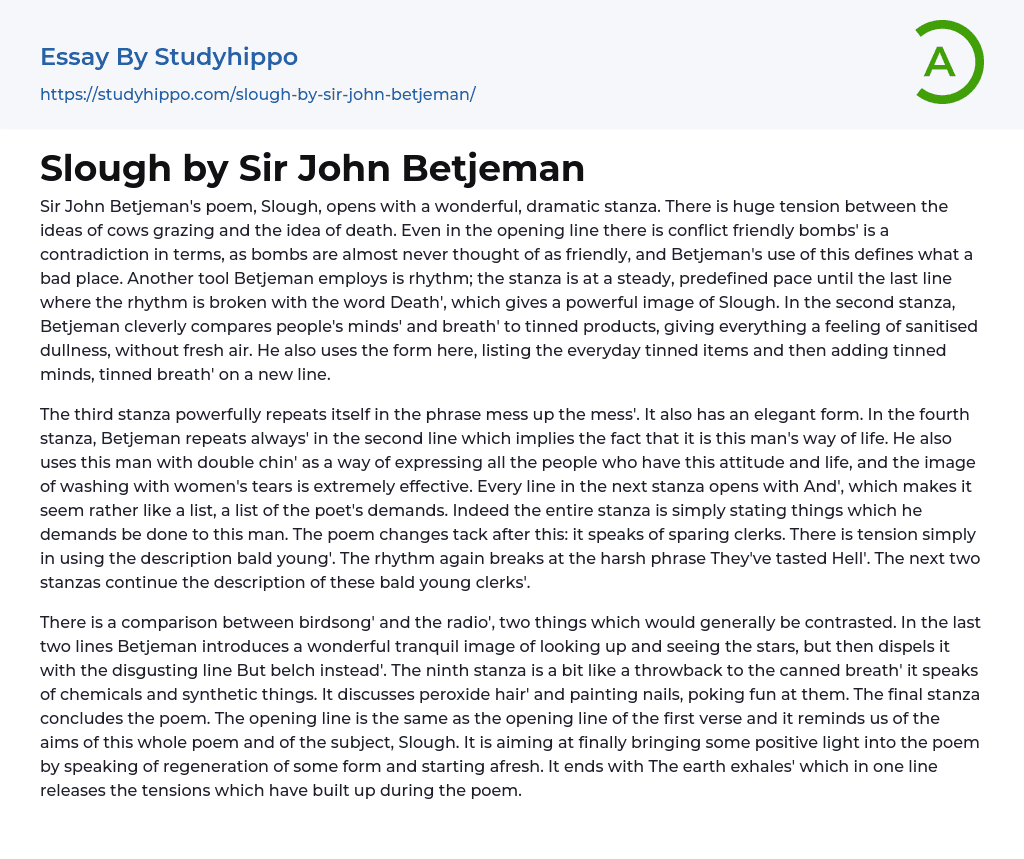Sir John Betjeman wrote a poem called Slough, which begins with a striking stanza. The contrast between cows peacefully grazing and the concept of death creates significant tension. This contradiction is highlighted by Betjeman's use of the term "friendly bombs," as bombs are typically associated with destruction rather than being friendly. This oxymoron serves to portray Slough as an undesirable place. Additionally, Betjeman employs rhythm to create a steady and consistent pace in the stanza, except for the last line where the word "Death" disrupts the rhythm and conveys a powerful image of Slough. The second stanza cleverly compares people's minds and breath to canned products, creating an atmosphere of sanitized monotony devoid of fresh air. The structure of the stanza reinforces this effect by listing everyday canned items
...before introducing the concepts of canned minds and breath on a separate line.
The third stanza repeats the phrase "mess up the mess" with powerful effect. It also has a graceful structure. In the fourth stanza, Betjeman repeats "always" to convey that it is this man's way of life. He also uses the term "this man with double chin" to represent all those with this attitude and lifestyle, and the image of washing with women's tears is incredibly impactful. Each line in the following stanza begins with "And," giving it a list-like quality, outlining the poet's demands. In fact, the entire stanza simply states what he demands be done to this man. The poem then shifts focus, speaking about sparing clerks. There is tension in using the phrase "bald young" to describe them. The rhythm breaks once again with the harsh line "They'v
tasted Hell." The next two stanzas further describe these bald young clerks.
The comparison between 'birdsong' and the 'radio' is made in the poem, highlighting their contrasting nature. Betjeman's last two lines depict a serene image of looking at the stars, but it is quickly shattered with the unpleasant phrase 'But belch instead'. The ninth stanza brings up memories of artificial breath, discussing chemicals and synthetic items. It playfully mocks aspects like peroxide hair and painted nails. The final stanza serves as the conclusion of the poem. It starts with the same opening line as the first verse, reminding us of the poem's purpose and the subject, Slough. Its aim is to finally introduce some positive elements by mentioning regeneration and starting anew. It concludes with the line 'The earth exhales', which releases the accumulated tensions throughout the poem.
- Boo Radley essays
- Genesis essays
- Richard iii essays
- Alice in Wonderland essays
- On the road essays
- Ozymandias essays
- The Nightingale essays
- Holden Caulfield essays
- Animal Farm essays
- 1984 essays
- A Hanging essays
- Shooting An Elephant essays
- A Tale Of Two Cities essays
- Adventures Of Huckleberry Finn essays
- Arthur Conan Doyle essays
- Brave New World essays
- Characters In Hamlet essays
- Characters In Romeo And Juliet essays
- Desdemona essays
- Diary Of A Wimpy Kid essays
- First-Person Narrative essays
- Frankenstein essays
- Heart Of Darkness essays
- Jane Eyre essays
- Jay Gatsby essays
- King Duncan essays
- Librarian essays
- Little Red Riding Hood essays
- Lord Of The Flies essays
- Silas Marner essays
- The Cask Of Amontillado essays
- The Catcher In The Rye essays
- The Crucible essays
- The Handmaid's Tale essays
- The Reader essays
- Virgil essays
- Wuthering Heights essays
- Candide essays
- Castle essays
- J. D. Salinger essays
- Ulysses essays
- Ethan Frome essays
- In Cold Blood essays
- Outliers essays
- Tuesdays With Morrie essays
- The Art of War essays
- Wife of Bath essays
- Huckleberry Finn essays
- The Lady With The Dog essays
- Great Expectations essays




